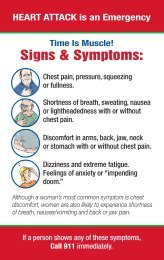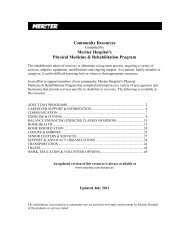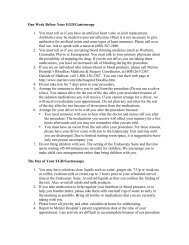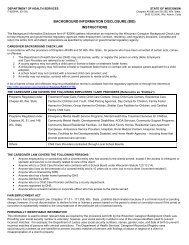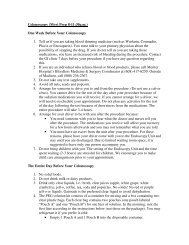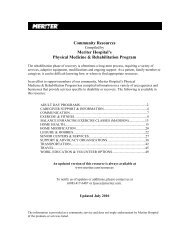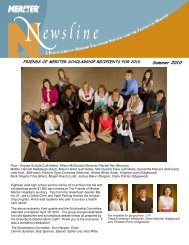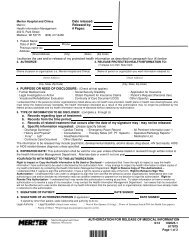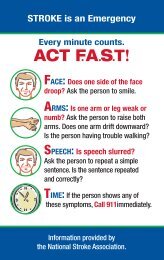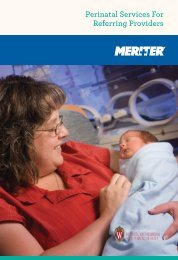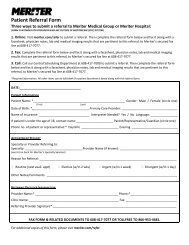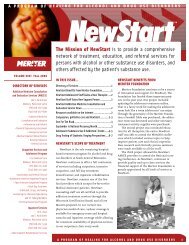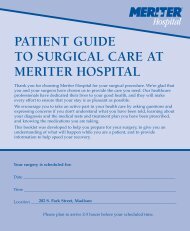A Guide To Your New Family's First Weeks - Meriter Health Services
A Guide To Your New Family's First Weeks - Meriter Health Services
A Guide To Your New Family's First Weeks - Meriter Health Services
You also want an ePaper? Increase the reach of your titles
YUMPU automatically turns print PDFs into web optimized ePapers that Google loves.
Sibling Relationships<br />
Most families experience growing pains with the addition of a new baby. <strong>Your</strong> older children may need assurance that<br />
your baby is a family addition, not a replacement. Assure your children that there is plenty of love to go around and<br />
that each child is special.<br />
In The Hospital<br />
Hospital Visits<br />
Older siblings often want to be the first visitors to<br />
see the baby. Try to schedule the first visit without<br />
other visitors present, and when the child is well<br />
rested and fed.<br />
Keep your baby in the crib until the child is ready<br />
to meet her. This keeps mom’s arms ready for a big<br />
hug and greeting. Some families like the children to<br />
exchange a small gift.<br />
Base the length of the visit on the child’s behavior.<br />
Sibling visits are important, but set aside some time<br />
for just mom, dad and the new baby.<br />
At Home<br />
Baby’s Homecoming<br />
Some families make the trip home from the hospital<br />
a family event. Others prefer to have the older<br />
children wait at home for your baby to arrive. Mom’s<br />
arms should be free and ready to receive the older<br />
children.<br />
Visitors<br />
If possible, delay visitors for a few days to keep the<br />
family focused on each other. Children have enough<br />
trouble sharing their parent’s attention with the new<br />
baby.<br />
When visitors do arrive, encourage their attention<br />
toward the older children. It’s nice to let the older<br />
children introduce the baby to guests and open any<br />
baby gifts they might bring. Visitors sometimes help<br />
by bringing a special treat or gift for the older<br />
children.<br />
Helping <strong>Your</strong> Child Adjust <strong>To</strong> The Baby<br />
Parents need to let the sibling relationship develop<br />
at its own pace, while at the same time providing<br />
guidance and support for sibling bonds.<br />
<strong>Your</strong> older child may surprise you with behaviors<br />
you have never seen before. Some children have even<br />
asked their parents to “take the baby back to the<br />
hospital.”<br />
It is important to understand the developmental level<br />
of the older child. Try to look at the world and your<br />
new baby through that child’s eyes. Just because there<br />
is a new baby, you cannot expect older children to<br />
behave more maturely than their age allows.<br />
You should relate changing roles and responsibilities<br />
for older children to their age rather than because of<br />
a new baby. Resist making other major changes in<br />
your older children’s lives until they have had time to<br />
adjust to the new baby.<br />
Visit your local library or bookstore for books on<br />
child development and sibling relationships.<br />
Siblings And Safety Issues<br />
Children, especially toddlers and preschoolers, are<br />
not aware of safe behavior around babies. Parents<br />
must set rules and teach appropriate behaviors. Here<br />
are several ways to increase your children’s safety:<br />
• Monitor your older child and baby until you<br />
feel comfortable leaving them in a room alone<br />
together.<br />
• Teach your older child how to gently touch and<br />
cuddle your baby.<br />
• Remind your older child not to throw things<br />
around the baby, to keep small toys out of baby’s<br />
reach and never put things in the baby’s mouth.<br />
• Make sure your older child is seated when holding<br />
a baby. Do not let your child walk while carrying<br />
the baby.<br />
• Emphasize that the older child should always<br />
support your baby’s head.<br />
• Teach proper use and safety around baby<br />
equipment such as swings, strollers and bouncy<br />
seats.<br />
• Utilize audio monitors can be helpful for listening<br />
to sibling interactions.<br />
55



